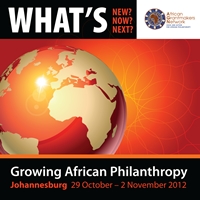Day one of the Second Biennial African Grantmakers Network Assembly, held 29 October to 2 November in Johannesburg, South Africa: the overriding mood of the After Tea Armchair Session on Growing African Philanthropy, facilitated by Bisi Adeleye-Feyemi, was that the vision for this conference has to be about facilitating the agency of ordinary people. The world is changing rapidly, leaders are discredited or corrupt, the Arab Spring and other uprisings are demonstrating the will of the people and their refusal to collude in illegitimate regimes.
Speakers – Jay Naidoo (with both his GAIN and his Mo Ibrahim hats on), Colin Bruce from the World Bank and Wiebe Boer from the Elumelu Foundation in Nigeria – emphasized the moves towards democratization of development in Africa. There is no longer a monopoly on ‘solutions’. However, there is a growing sense of urgency to solve problems of poverty. Solidarity is very important, together with mutual accountability. Knowledge and new ideas are part of the African philanthropy paradigm.
Speakers deliberated on the factors holding this vision back. Paramount is the lack of good governance and leadership. Building civil society at the continental level should be the single most important contribution of African philanthropy. It is time for Africa’s voice to be heard in Africa. African philanthropy can facilitate space for the poor to speak for themselves.
At the global level organizations are much too busy serving the agendas of donors. This is true in Africa as well – we are losing touch with people on the ground as we struggle with complex and inappropriate requirements such as evidence-based indicators and require new software to make it even more difficult for Africans. All the while the most important feedback is from the constituency on the ground.
Business, government and civil society need to work together. Governments need to demand that businesses operating in Africa pay their outstanding taxes – this would go a long way to meeting development funding needs.
Role of the private sector
The role of the private sector in poverty reduction was the focus of a parallel afternoon session entitled ‘From corporate philanthropy to inclusive business’.
This session focused on the urgent need for new and more developmental modes of corporate social responsibility. Tracey Henry from Tshikululu stated that the best way in which the corporate sector can help alleviate poverty is through doing successful business that contributes to economic growth.
Nicola Galombic from Yellowwoods explained how her company has recognized that poverty and inequality are clear and present issues, which must be addressed. Yellowwoods’ core business strategy includes inclusive business as a way towards sustainable change.
This model goes way beyond notions of responsibility – Yellowwoods has to be creating social value, changing the environment in which the company operates. The company does this through financial inclusion programmes that bring poor families and young people into the formal economy. An aspect of this is a partnership called Harambe with Standard Bank and with NGOs.
Standard Bank’s Riaan Barnard shared the inclusive banking model whereby the bank works at the base of the pyramid with hitherto totally unbanked people. This programme is completely separate from the bank’s corporate philanthropy programme.
Prega Ramsamy from Finmark Trust supported the requirement to move beyond corporate philanthropy while Tracey Henry spoke for a developmental approach to social investment. She emphasized that the prevalent trend for ‘tick-boxing’ in order to comply with black economic empowerment requirements is totally unacceptable.
A round of lively audience participation rounded off the session. Key points emerging were:
- Companies can leverage a variety of ‘passions’ and leadership modes to contribute to social change. While not everyone wants to volunteer in communities, most employees have something to give.
- The inclusive business model is clearly providing value – how does this relate/does it relate to strengthening civil society organisations?
- Another important contribution by business is supporting knowledge development via think tanks.
- The war against poverty needs to leverage all the varieties of energy present within companies – volunteering is a small part of that puzzle.
- Many boards now spend time on the social aspects of sustainability. There is growing recognition that successful business takes place in stable and prosperous societies
In summing up the facilitator noted that change can take place in unlikely places if the company is open to individuals exhibiting leadership and ingenuity within their own areas of expertise and passion.
 Colleen du Toit is CEO of CAF Southern Africa. Colleen can be followed on twitter
Colleen du Toit is CEO of CAF Southern Africa. Colleen can be followed on twitter @ColleenAnne2. Updates from the conference can be followed at hashtags #agn and #africangrantmakers.
Attendees at the African Grantmakers Network Assembly are eligible for discounted subscriptions to Alliance magazine – further information can be found on the discount form.






Comments (0)